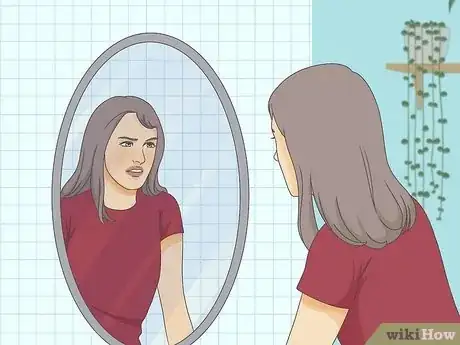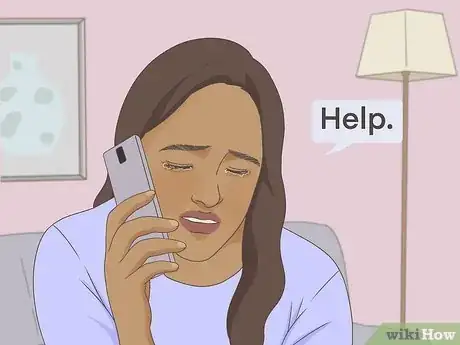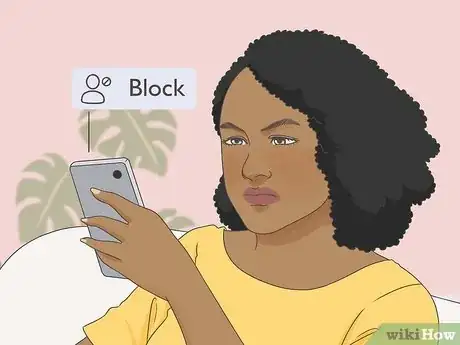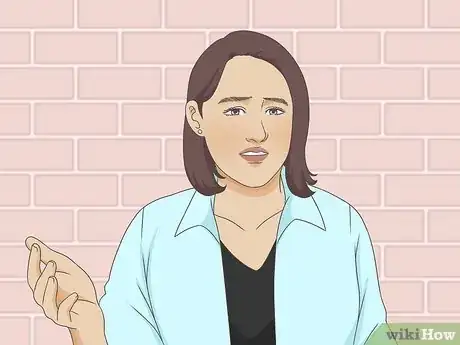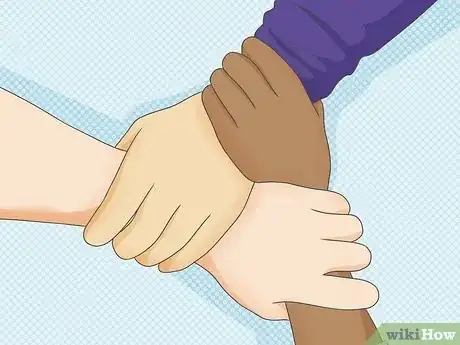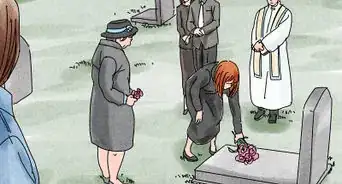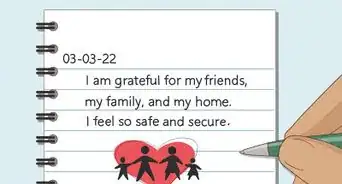This article was co-authored by Paul Chernyak, LPC. Paul Chernyak is a Licensed Professional Counselor in Chicago. He graduated from the American School of Professional Psychology in 2011.
There are 7 references cited in this article, which can be found at the bottom of the page.
This article has been viewed 12,808 times.
Victim blaming occurs when someone blames the victim of a trauma, crime, or attack for what happened to them. Friends and family may blame you for what happened, or you may feel blamed for what happened by society and the media. No matter who is victim blaming you, it is hurtful and harmful to your mental and emotional state. To recover from victim blaming, you should remind yourself it wasn’t your fault, let go of negative people, and find ways to regain your happiness and sense of control.
Steps
Dealing with Negative Emotions
-
1Remind yourself that it wasn’t your fault. One of the keys to victim blaming is the fact that you think it is your fault. This may come from yourself, family or friends, or even society. There are many reasons you may blame yourself, but remind your multiple times each day that it was not your fault.[1] People who victimize others are always doing it to deal with their own issues.
- You may think it was your fault you were abused, raped, attacked, or the victim of a crime. You may dissect everything you’ve done and find ways you messed up. Stop doing this. If you were abused, raped, attacked, or the victim of a crime, that was not your fault.
-
2Deal with negative emotions. Part of recovering from victim blaming is letting go of negative and false emotions. This could be guilt, anger, fear, sadness, or anything else. Once you work through the emotions and let them go, you can move forward.[2]
- First, you should acknowledge the emotions. Close your eyes and imagine all the emotions you feel, even if they are uncomfortable or hurt you. Give them names, like guilt, fear, or anger.
- After you’ve acknowledged them, tell yourself that they are only emotions and hold no power over you. Then, imagine that you are letting them go one by one. You may imagine they are balloons that you release and watch go away or wisps of smoke that you watch disappear.
- Be aware that negative emotions are often stored in the body, so it is important to use relaxation techniques to relieve yourself.[3] For example, you can try using progressive muscle relaxation, deep breathing, or meditation for 15 minutes or more daily.
Advertisement -
3Accept that what you are feeling is normal. When you have been the victim, you may feel many different things. You may feel that you are wrong for feeling these things and not being able to get over them. However, this is not true. Experiencing negative reactions and emotions are a normal symptom that follows a traumatic event.[4]
- For example, feelings of helplessness, shame, or guilt are normal responses.
- Avoid suppressing or ignoring negative emotions because this can lead to unhealthy coping mechanisms and health problems. That is why it is important to accept your emotions and deal with them.[5]
-
4Confront your feelings of blame. As you work through your feelings, it may help to confront your guilty feelings. Victim blaming leads to feeling like what happened to you was your fault, so confronting those feelings can help you take control of them and get rid of them.[6]
- When you have a thought blaming yourself, like “I deserved it,” “I should have paid more attention,” or “Maybe it was what I was wearing,” you should figure out why you think that. Did it just come to you randomly, or did someone or something you read make you think it?
- Tell yourself, “This thought is wrong. The abuse/rape/crime was the choice of the attacker. They made the choice to hurt me. I am not at fault.”
Letting Go of Negative People
-
1Prioritize your well-being. When you are a victim, you should put yourself first. That means you should cut out negative and damaging things in your life. If you feel threatened, walk away. If you feel it is your fault or someone blames you for the situation, remind yourself that is not true. Put yourself first and leave.[7]
- If you are in an abusive situation, you may want to contact emergency services, the police, or a domestic violence agency in your area.
-
2Let go of toxic people. When you have suffered trauma or abuse, you may find there are people who are not good for you. They may not believe you, or they may blame you and belittle your experience. These are not people you should be around. If friends, family members, or coworkers tell you it was your fault or that you deserved it, you should step away from that person.[8]
- It may be difficult to let go of someone you care about, especially in this difficult time. However, your emotional and mental health is more important. If a person is being toxic to you, they are not worth it. You deserve supportive, healthy people around you.
-
3Set boundaries. If you have been the victim of abuse, you may need to set boundaries. Being around the other person may be damaging to your mental and emotional state and reinforce your sense of guilt. You may have to set boundaries with friends or family members who don’t believe you or blame you. Set firm boundaries for you and others if you need to.
- Cut off contact with the person who abused or hurt you. If you have to see them, do it in a neutral location and take a trusted friend or family member with you.
- Stick to your boundaries. Remember that your mental health is important and that you don’t have to please others.
Moving Forward
-
1Talk about what happened to you. One way to stop feeling like a victim is to talk about your experience. Breaking your silence can help let go of your guilt and blame. It can also help with the healing process and help you to let go of the guilt and shame that often accompany abuse.[9] This helps you move past any stigmas, any fear of judgment, and feelings that you are wrong.[10]
- Tell your story to someone you trust. If you feel like it, tell your story to multiple people you trust.
- As you tell the story, place the blame on the correct person and not you. This may be the abuser, the rapist, or the criminal.
-
2Do things that make you happy. Part of taking your life back includes doing things that you enjoy and bring you happiness. This may be picking up old hobbies that you loved doing or trying new things. Find ways to make yourself happy and feel worthwhile.[11]
- Make a list of things that you enjoy doing. This can give you something concrete to follow if you can’t come with any ideas.
- Add new things you’d like to try onto the list. Trying new things can help you move forward as you recover.
- For example, you may take up gardening, take a class, join a gym, learn to play an instrument, volunteer, or start cooking again.
-
3Volunteer to help others. When you suffer from victim blaming, you may feel powerless and hopeless. To try to regain some confidence and a sense of power, try volunteering and working to help others in some way. You can do something small or large to help others.[12]
- Try volunteering for a local organization or an animal shelter. You may want to plant trees or help with a food drive or food bank. You can also help in small ways, like giving blood or donating money to a charity.
Seeking Support
-
1Talk to someone you trust. Part of the recovery process includes talking to someone who believes you and who you trust. This person should be someone who accepts that you are the victim and who doesn’t blame you. Share with the person how you feel, both the good and the bad things.[13]
- You may say, “I appreciate that you believe me and don’t blame me for what happened. I would like to talk about what happened to me. I think it will help me stop blaming myself.”
-
2Seek professional help. If you are struggling with recovering from victim-blaming, you may want to consider professional help. Talking to a licensed mental health professional may help you learn effective strategies to cope and move on.[14]
- Look for a counselor in your area who specializes in victim blaming or trauma.
- Be sure to seek professional help if you start experiencing secondary affects from the abuse, such as isolation, self-harm, and depression.
-
3Find a support group. Talking about what has happened to you can help you process. It may also help to talk through how people around you and society makes you feel guilty even though you are the victim. A support group for other trauma or abuse survivors, or a support group for victims, may help.[15]
- Look online or contact a local hospital to find support groups in your area.
- You may consider an online support group if you don’t feel like going to one in person.
References
- ↑ https://www.helpguide.org/articles/ptsd-trauma/recovering-from-rape-and-sexual-trauma.htm
- ↑ https://www.helpguide.org/articles/ptsd-trauma/recovering-from-rape-and-sexual-trauma.htm
- ↑ http://tinybuddha.com/blog/how-to-release-the-painful-memories-emotions-stored-in-your-body/
- ↑ https://www.helpguide.org/articles/ptsd-trauma/recovering-from-rape-and-sexual-trauma.htm
- ↑ http://www.mortylefkoe.com/suppressing-emotions/
- ↑ http://everydayfeminism.com/2015/09/overcome-self-blame-assault/
- ↑ https://www.psychologytoday.com/blog/prescriptions-life/201310/how-stop-people-pleasing
- ↑ https://www.psychologytoday.com/blog/inviting-monkey-tea/201303/letting-go-toxic-people
- ↑ http://www.mortylefkoe.com/suppressing-emotions/
- ↑ https://www.helpguide.org/articles/ptsd-trauma/recovering-from-rape-and-sexual-trauma.htm
- ↑ https://www.helpguide.org/articles/depression/dealing-with-depression.htm
- ↑ https://www.helpguide.org/articles/ptsd-trauma/recovering-from-rape-and-sexual-trauma.htm
- ↑ https://www.helpguide.org/articles/ptsd-trauma/recovering-from-rape-and-sexual-trauma.htm
- ↑ https://www.helpguide.org/articles/ptsd-trauma/recovering-from-rape-and-sexual-trauma.htm
- ↑ https://www.helpguide.org/articles/ptsd-trauma/recovering-from-rape-and-sexual-trauma.htm



